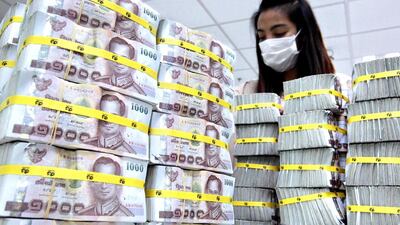Many of the emerging markets’ biggest financial crises have followed a pattern in the past two decades, one that Egypt might be well advised to take careful note of.
The usual scenario has been for the country in question to insist on keeping its currency strong against international currencies, particularly the US dollar.
The argument has been that a slide in the currency’s value would make imports more expensive, thus igniting generalised inflation in the economy and making life difficult for citizens. Another occasionally offered argument is that local companies have built up debt in foreign currencies, and a fall in the local currency might make them insolvent.
But after a time, the artificially strong currency weakens the country’s finances and the central bank begins drawing down its international foreign currency reserves to continue supporting its currency until some sort of economic shock brings the structure down.
The final stage is generally a bailout package, often provided by the IMF.
Egypt’s own currency crisis was caused by a political and economic shock – a popular uprising in 2011 that led investors to pull their money out of Egyptian pounds and caused its main source of foreign currency, tourism, to dry up.
The crisis has yet to run its course, with the risk that some sort of shock could destabilise the economy.
Rather than allow the Egyptian pound to weaken, the country’s central bank chose to keep its official price steady by drawing down foreign currency reserves, which stood at US$36 billion in 2011.
It did so in the belief that the crisis was temporary and that any devaluation would exacerbate inflation.
It also worried that any sign of weakness in the currency risked sparking a rush to US dollars, causing the Egyptian pound’s intrinsic value to spiral downwards.
The controls seem to have become semi-permanent. As Egypt’s foreign currency reserves dwindle, the country’s central bank imposed ever-increasing controls on the purchase of foreign exchange.
One hopes that the government will continue to press ahead with economic reforms and allow the currency to weaken. That is because the precedents for propping up a country’s currency do not augur well. Consider the cases of Mexico, Thailand and Malaysia.
In Mexico, the government in early 1994 ramped up its issuance of peso-denominated short-term treasury bills, but with returns tied to the US dollar. The bills were snapped up by foreign investors, especially after Mexico joined the North American Free Trade Agreement on January 1, 1994.
But it was an election year, and political turmoil – including the rise of the Zapatista rebel insurgency and the assassination of a presidential candidate – began undermining confidence. The central bank started issuing dollar-denominated treasury bills to buy pesos, supporting the currency. The government feared that if the peso fell, the electorate would be angered by the ensuing price increases.
Sensing that the peso was overvalued, foreign and Mexican investors began shifting their funds out of the peso, further weakening the currency.
The central bank began to spend its foreign currency reserves to defend the peso, and it ran out of dollars entirely by December 1994. As investors fled the peso, the government in December was forced to float the peso, and it fell by about 30 per cent that month.
Mexico signed a bailout package with the IMF the next month, topped up with funds from the US government and others for a total US$50bn.
Eventually the peso regained some of its value, but the economy, which had grown 4.8 per cent in 1994, shrank 6.2 per cent in 1995 in its worst economic crisis since the 1930s. Economic growth recovered to 5.1 per cent in 1996.
Less than three years later, Thailand was hit by currency speculators. The baht had been pegged against a basket of currencies at a level stronger than the market price.
The Thai government was afraid that a weaker baht would cause the price of imports to rise, hurting consumers, and that companies that had borrowed heavily in foreign currencies would not be able to repay their debts. In six months, the Thai government drew down its foreign currency reserves to $30.9bn in June 1997 from $37.2bn in December 1996. It raised interest rates to as high as 24 per cent.
Investors transferred billions of dollars out of the country. When the baht was floated on July 2, 1997, it weakened from 25 bahts to the dollar to 55 in January 1998. The Thai government later signed a $17.2bn bailout agreement with the IMF.
Thailand’s GDP growth fell from 5.9 per cent in 1996 to minus 1.4 per cent in 1997 and minus 10.5 per cent in 1998, but recovered strongly in 1999.
The country’s financial crisis sparked a similar shock in Malaysia, which had relatively little foreign debt and did not feel the need to seek the IMF’s help, but it deployed many IMF-influenced measures.
Malaysia raised interest rates, floated the ringgit and cut government spending by 18 per cent. The ringgit plunged to 4.9 to the dollar in January 1998, from 2.4 in 1997.
In 1998, Malaysia adopted an unorthodox policy mix of pegging the ringgit against the US dollar, enacting foreign-exchange controls and putting deficit financing in place to reflate domestic demand.
Its GDP shrank 6.7 per cent that year, compared to an expansion of 7.7 per cent in 1997. The economy recovered in 1999.
Patrick Werr has worked as a financial writer in Egypt for 25 years.
Follow The National's Business section on Twitter

